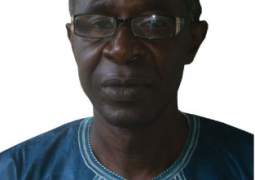Momodou Aki Bayo, Minister of Lands and Regional Government, has stated that as the capital city of The Gambia, the Banjul Bicentenary event is of great national significance.
“Therefore, it is a source of great satisfaction that His Excellency Sheikh Professor Alhaji Dr Yahya A.J.J. Jammeh, President of the Republic of The Gambia fully supports the observance of this historic event,” Hon. Bayo said while giving a statement at the Banjul Bicentenary event in Banjul held at the weekend.
He underscored the strong attachment of the head of state to Banjul and its people, and recognition of the pivotal role Banjul and its people have always played in the socio-economic development of The Gambia throughout its history.
“It is expedient to recall the rich culture and tradition of this city and religious harmony that has always happily existed between the various faiths.
“In fact, from the very beginning, Banjul has always been cosmopolitan where different ethnic groups and nationalities existed and still co-exist in harmony, inter-marrying and respecting fully one and other beliefs and customs.
“The rich history of this great city reveals the resistance and fortitude of its people from domination from the time the resisted the entry colonialists – Portuguese, Spanish, French, British and Dutch - into the Gambia River up to 1455.
Although the British eventually colonised The Gambia, the resistance of the people of Banjul to foreign occupation and domination never waned.
This leads us to recall the fight for political rights and freedom spearheaded by veterans like Edward Francis Small, Pierre Sarr Njie, Rev. J. C. Faye, Alhaji I.M. Garba Jahumpa and veteran Trade Union leader M. M. Jallow, among many others.
“This resistance against foreign domination was equally manifested and effective when Britain and France attempted to make The Gambia part of Senegal and the French empire in West Africa.
“Banjulians have always strived for self-reliance through hard work, perseverance and ingenuity. As a result, Banjul which was ceded for a mere 25 Pounds (One Hundred and Three bars of gold) to the British by Tumani Bojang, King of Kombo, became not only the administrative centre of The Gambia, but significantly a financial and commercial hub of the West African Sub-region.
“I am sure you all will agree with me that such an achievement is only possible under the conducive environment created by President Jammeh’s government since the great 22nd Revolution with the unprecedented peace and stability it has ushered into our dear country.”
Mam Sait Ceesay, Secretary General of the Banjul Bicentenary organizing committee, in his remarks, said the island Banjul used to be famous for its bamboo trees, and the name Banjulo literally means ‘bamboo’.
He said the British first named the city after Earl Bathurst, British Secretary for Colonies at the time, but after The Gambia attained independence in 1965 it was re-named Banjul.
He added that the city is full of historic buildings and sites, and is a living monument to The Gambia’s past.
On 29 November 1815, Mr Ceesay explained, Sir Charles MacCarthy ordered Captain Alexander Grant to proceed from Goree (a fortified Island to the north, off the coast of Senegal) with a detachment of the African Corps, “to examine the visibility of establishing a military strong point on Banjul Island.”



